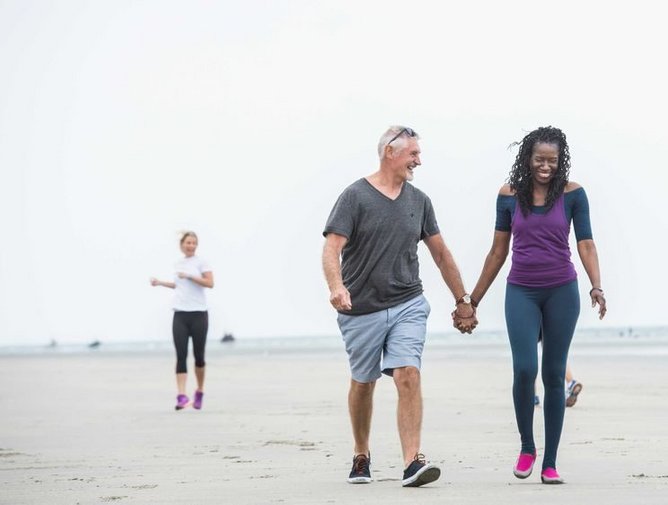Vitality: delivering a valuable experience for customers
In an insurance market beginning to take stock of the potential for digital transformation to improve the traditional business, Vitality is a shining example of a company approaching a centuries-old industry from a refreshing new angle. Founded in 2004, the company’s enduring focus has been not only to provide first-class health and life cover but to actively improve the quality of its customers’ lives. Summarising this approach as “good for them, good for us, good for society”, Vitality has even set the ambitious target of encouraging 100mn people to get 20% more active by 2025. Helping to explain how the company is achieving this and so many other impressive developments, Dave Priestley, Chief Digital Officer, spoke with us on why driving value and a superior customer experience is so vital.
Priestley started with Vitality early on as a Sales Director for a joint project launched between South African company Discovery Ltd and Prudential PLC, one of the UK’s most established insurance companies. Now in his 16th year at Vitality - taking on the role of CDO in 2017 - Priestley says that what inspired him about the organisation was its aspiration to do something fundamentally different within insurance. “The industry had remained relatively unchanged for a long time,” he recalls. “It was an uninspiring marketplace with very similar product offerings. When I joined the company it was clear right away that Vitality had a very different proposition for health insurance.” That proposition was integrating insurance with wellness, something which he remarks has started to scale exponentially since 2004. “Now, almost all of the players in the market have some kind of wellness component in their proposition. However, at the time, I would say we were amongst the first to introduce it.”
More recently, the evolution of technology is another key development that Priestley has observed, specifically the ability to monitor peoples’ health remotely, conduct video consultations, utilise AI-powered diagnosis tools, symptom checkers and more. Far from being simply restricted to a GP surgery or hospital, modern healthcare can be brought directly to people’s homes and the insurance industry has followed suit. The balance in incorporating these exciting new possibilities at Vitality, he continues, lies in the unification of its digital and overall business strategies. “It's less about delivering a digital strategy in isolation and more about considering how the digital team can support the company in achieving its goals.” One of the significant journeys that this mindset has led to is the creation of “one Vitality experience”, wherein health insurance and life insurance investments are consolidated into one easy-to-manage platform for customers.
Digital transformation has not been without its challenges; established five years before the ‘digital native’ era of businesses, Vitality initially began at a disadvantage but quickly recovered: “We were established on a more traditional technology model with legacy systems in place,” Priestley states. “One of our most important challenges has been reconciling our culture with the digital world.” Investing time and resources in building trust amongst its stakeholders by hiring teams of digital specialists to help accelerate transformation, Vitality has succeeded in marrying tech advances with its core purpose: making people healthier. The company’s new Advisor Hub, utilising microservices instead of monolithic alternatives, is a prime example of the new agility and efficiency being unlocked. “Our strategy is aimed at breaking up those back end legacy systems into multiple components. This allows us to iterate rapidly on the front end at lower cost by not needing to return to the back end in order to implement relatively small changes in the experience,” he says.
One of Vitality’s core innovations is its member’s app. Available on both iOS and Android, Priestley claims that the app “really gets to the heart of what's different about Vitality from traditional insurance products.” Serving as the company’s primary interface with its customers, policyholders are able to link their other health tracking apps, Fitbits, Garmins, Apple Watches and other IoT (internet of things) devices to it. The app then converts physical activity data into ‘Vitality Points’ and provides access to incentive-based rewards when they achieve certain point-based targets. “The app will show how your points are accumulating and what rewards you've unlocked. We're increasingly building more and more reward fulfillment into that interface,” he explains. For example, if a customer earned a certain amount of ‘Vitality Points’ for working out a pre-set number of times per week, they would be entitled to a free coffee, movie download or more. “It also holds your policy information,” continues Priestley. “If for any reason you need to quickly access your policy details, renewal day or something else, it’s all in there.”
Conceiving such an innovative way of encouraging people to stay healthy and active is impressive, but Vitality would not have been able to implement such a rewarding programme without the help of its many suppliers and partners. One partner, Tata Consultancy Services (TCS), has been instrumental in helping Vitality deliver its new services. Based in Mumbai, India, TCS is a multinational IT and consulting company with a truly global reach of 149 locations spread across 46 countries. Regarding Vitality’s special relationship with TCS, Priestley had this to say: “We don't have the scale as a business to be efficient at some of the technical delivery skills necessary; we’ve found it far easier to find a partner to supply those skills. TCS is a partner that really understands our business: Vitality’s fast and dynamic culture is different to other insurance companies. TCS realises this and that’s allowed it to embed within our teams; we don’t call on it simply when we’ve got a big project; TCS helps us to continually improve our customers’ experience across the board.”
Vitality has announced that Coronavirus (COVID-19) tests will be available to its health members as of 29 July 2020. The test will be able to accurately tell whether a patient has the virus currently or ever did in the past.
All tests will be provided though its partnership with DocTap, a face-to-face GP provider.
“DocTap are proud to be working with Vitality in the fight against COVID-19. Our ambition is to provide the most accurate, convenient, affordable and fastest COVID-19 tests on the market, backed up by our outstanding team of doctors,” said Dan Faber, founder of DocTap.
Vitality’s commitment to providing its customers with the stellar level of service it has become known for was thoroughly tested by the COVID-19 pandemic. “Our number one priority was the welfare of our staff,” Priestley declares, “but we also had to make sure that they could still deliver first-class service to our members.” Mobilising its IT operations department to quickly find a workable solution, he reports that the company managed to accommodate its full complement of staff (1,500) with remote working capabilities within a period of approximately 10 days, a significant logistical achievement. In parallel, Vitality rapidly innovated its customer proposition by adding a new category of benefits under the banner of ‘Vitality at home’. This involved negotiating commercial arrangements to provide members with discounts linked to physical activity and integrating with these partners so that a fully digital end to end experience was up and running within three weeks of lockdown starting.
“That was a big success for us; we were still able to provide comprehensive wellness benefits to our members by capitalising on our cultural assets.” In many ways the achievement encapsulated the thoroughness of Vitality’s strategy and demonstrated its adept digital skills. It also demonstrates Priestley’s insistence that any tech innovation introduced has a functional purpose in delivering quality service to users. “Philosophically, Vitality focuses on the outcome we're looking for and then works out what technology solution would be best.” Not allowing the technology itself to guide his approach, Priestley says that the current applications of blockchain would not benefit the company’s customers at this time, although explorations of AI (artificial intelligence) and ML (machine learning) had revealed their potential for ‘proactive servicing’. “You can then reach out to customers and ask, ‘How can we help?’ We're also using ML models to power personalisation in the experience, as well as RPA (robotic process automation) to speed up admin and allow our staff to focus on value-adding work instead.”
Although 2020 has been a catalyst year for change across so many aspects of life globally, Vitality retains the same level of commitment to making people healthier that it always has. There can be no mistake: the insurance industry is changing, with or without COVID-19, but the desire for digital transformation which the pandemic’s restrictions have introduced is here to stay. “Things will be different to how they were,” says Priestley. “For Vitality, that's a good thing because we’ve always thrived on evolution.” When asked to summarise what has enabled him to spearhead such a successful digital-business strategy, he emphasises that customer-centricity is always at the forefront of his mind and always yields the best results. “People always show a lot of interest in talking about particular technologies, but what's more important is focusing on how to support customers to achieve their goals. That’s what keeps Vitality so grounded.” Ultimately, Vitality demonstrates that an insurance company’s worth is derived from its ability to improve the quality of its customers’ lives and devoting itself wholeheartedly to that goal. “If you just concentrate on trying to deliver value for your customers and creating an exceptional experience, more often than not, you're going to do the right thing.”




